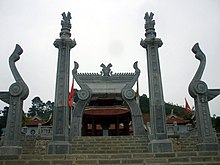Lạc Long Quân (secara harfiah disebut "Tuan Naga dari Lạc"; juga disebut Hùng Hiền Vương) yang dikenal sebagai Hùng Vương II, merupakan Raja Hùng kedua dari Dinasti Hồng Bàng, Vietnam kuno (dikenal kemudian sebagai Văn Lang dan sebelum itu sebagai Xích Quỷ). Quân adalah putra dan pewaris tunggal Kinh Dương Vương (raja Hung pertama), yang memerintah atas Xích Quỷ. Ia dianggap menjadi raja pada tahun 2793 SM. Ia juga merupakan seorang tokoh penting di dalam legenda Vietnam.
Di zaman modern, hidupnya bercampur dengan banyak legenda. Istri Quân, Âu Cơ, melahirkan kantung berisi 100 telur dari 100 anak yang lahir; ini merupakan asal mula kisah 100 nama wangsa Vietnam. Suatu hari Lạc Long Quân memberitahu Âu Cơ: "Saya adalah keturunan naga, anda dari peri. Kita tidak selaras seperti air dan api, jadi kita tidak harmonis." Ini mengatakan, suami istri berpisah. Pria itu pergi menuju ke laut dengan 50 dari anak mereka, sementara istrinya pergi ke daerah pegunungan dengan separuh yang lainnya. Sang putra sulung, yang mengikuti ibundanya,[1] kemudian menempatkan dirinya sendiri sebagai pewaris Quân.[2][3]
Silsilah
Ayahanda Lạc Long Quân adalah Kinh Dương Vương.[4]
Di dalam literatur Vietnam
Buku-buku Đại Việt sử ký toàn thư (dari abad ke-15) dan Lĩnh Nam chích quái ("Keajaiban dipetik dari debu Linh-nam", dari abad ke-14) menyebutkan legenda dengan Âu Cơ.[5]
Peninggalan
Sebagian besar kota di Vietnam menamai jalan-jalan seperti namanya.[6] Ia menampilkan keduanya di dalam pendidikan dasar,[7] dan di dalam beberapa bentuk kepercayaan religius populer sebagai dewa.[8][9]
Referensi
- ^ Ngô Thì Sĩ, Việt sử Tiêu án]
- ^ Roseane M Santos An Unashamed Defense of Coffee - Page 268 2009 "A Vietnamese myth claims that the Vietnamese people of various tribes were born outside the womb following the marriage of Lạc Long Quân (Dragon Chief) and Âu Cơ (the Fairy), but Vietnamese historians consider the Dong Son civilization ..."
- ^ Nghia M. Vo Saigon: A History 2011 -- Page 285 "According to legend, King Lạc Long Quân wed fairy Âu Cơ who gave him 100 children. Both considered to be the ancestors of the Vietnamese nation, they later split up; taking 50 children, he settled along the coastal area and founded the ..."
- ^ Keith Weller Taylor: The Birth of Vietnam. Revision of thesis (Ph.D), Appendix A, pg. 304. University of California Press (1991). ISBN 0-520-07417-3
- ^ Keith Weller Taylor: The Birth of Vietnam. Revision of thesis (Ph.D.). Appendix A, page 303. University of California Press (1991). ISBN 0-520-07417-3
- ^ Vietnam Country Map. Periplus Travel Maps. 2002–2003. ISBN 0-7946-0070-0.
- ^ Marie-Carine Lall, Edward Vickers - Education As a Political Tool in Asia - Page 143 2009 "'Vietnamese-ness'. The history of the country really started around 800 bc with the Văn Lang kingship. Children learn about the legends of the nation's birth, which feature heroic figures such as Kinh Dương Vương, Âu Cơ – Lạc Long Quân ..."
- ^ Andrea Lauser, Kirsten W. Endres - Engaging the Spirit World: Popular Beliefs and Practices in Modern Vietnam 2012 - Page 93 "of the Water Palace are linked to the mythical foundation of the country and they are considered to be descendants of the Dragon King of Động Đình, father of the mythic founder of the country, Lạc Long Quân. Images from this past are enacted ..."
- ^ Philip Taylor Modernity and Re-Enchantment: Religion in Post-Revolutionary Vietnam Page 68 2007 "According to legend, all Vietnamese people can trace their ancestry back to the marriage of the dragon father Lạc Long Quân and the fairy mother Âu Cơ. This magical union produced an egg sac from which hatched one hundred human ..."
Pranala luar
Lihat pula
